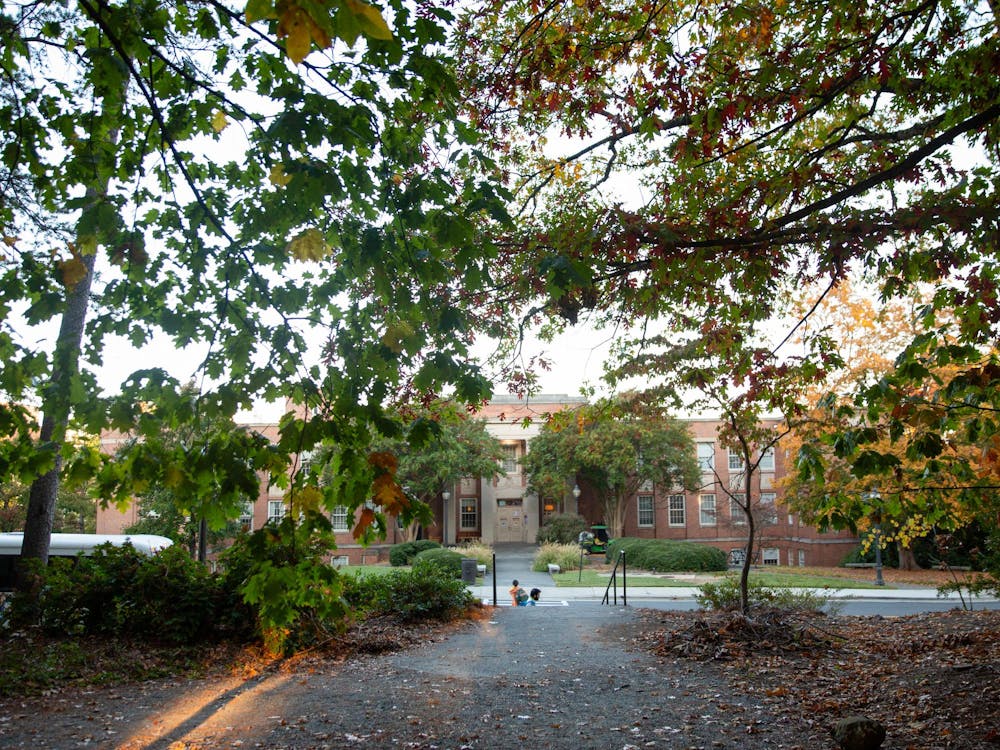Duke’s department of biology recently decided to press pause on one of its gateway courses, Biology 203, Molecular Biology, Genetics and Evolution, reportedly due to negative student feedback on the course’s intense workload and faculty concerns over its accessibility.
Biology 203 combined the content of two other gateway courses, Biology 201, Molecular Biology and Biology 202, Genetics and Evolution, into a single semester. Students with a score of four or five on the Advanced Placement Biology exam could bypass the department’s introductory courses and fulfill the gateway requirement for the biology major with just one class, giving them the flexibility to begin taking electives of their choice earlier.
Evelyn Shue, a sophomore double majoring in biology and cultural anthropology, took the class for exactly that reason.
“If I could get both intro[duction] classes out of the way in one semester, why not?” she said.
Based on prerequisites, all students ostensibly entered the course with the same background knowledge. For some, though, the more intense workload was “what [they] sign[ed] up for,” while for others, the gateway course proved to be a difficult uphill climb.
According to Shue, the class’s fast pace encouraged a model of “brute forcing” content into memory, quickly learning content for just one exam but forgetting it soon after as they began studying for the next. Isabel Fargo, a sophomore double majoring in biology and Spanish, similarly noted that even though she was familiar with the content after taking AP biology and courses in the “Exploration of Genetics and Genomics” FOCUS cluster, Biology 203’s high number of assessments made it feel like she was constantly studying something new for the class.
In an unlikely consensus, some professors shared similar sentiments on the course.
Some faculty members voiced concerns over Biology 203 being an “elitist” course. Professor of Biology Gregory Wray — the primary instructor for the course — pointed to a common sentiment that “only students coming from privileged backgrounds would have had the opportunity to prepare well enough that they could even take this class.” Though he maintained that such a characterization was “not 100%” accurate, he acknowledged that “several faculty felt that way.”
“We're kind of signaling that there's this special group of students, and we're going to give them a special course, so that was one concern,” he said.
Regardless, Wray questioned whether there is a way to “signal to students [that they] really might want to think carefully before decid[ing whether they] want to take this class,” adding that “it's a little hard to predict up front” which students are going to struggle.
According to Kelly Hogan, professor of the practice of biology and director of undergraduate students in the department of biology, students’ course evaluation responses revealed that many felt the course difficulty exceeded that of Biology 201 and Biology 202. Students also reported lacking the same level of support as their peers who went through the traditional gateway course progression.
Hogan said that one of the main reasons Biology 203 is being paused is because the department is in the process of revamping Biology 201 and 202. She noted that the curriculum committee decided to “take a break” from the course to focus its intention on improving the other gateway options, but that the department hasn’t “taken it off the books” permanently.
Hogan also stressed the importance of better orienting the format, objectives and skill sets of the Biology 201 and 202 progression with Biology 203 to create an inclusive pathway to welcome students into the biology major and discipline.
“I’m not sure that they were aligned,” she said. “When you take something that's two semesters and you squish it into one, you have less time for some of that skill-building and peer-to-peer collaboration.”
Still, student feedback wasn’t all negative.
Fargo expressed that Wray and the guest lecturers in the class were always very approachable and available before and after class.
Sophomore Daniel Levin, who is double majoring in biology and chemistry, agreed, sharing that he would consistently dedicate 15 to 20 minutes after class to ask questions and engage with the professors. He also expressed a strong appreciation for the lab component, highlighting how well the experiments aligned with the course content and how rewarding the semester-long project was for his academic growth.
Fargo and Shue made similar comments, noting that their favorite aspects of the course were the lab sections, instructors and “good community,” with Shue emphasizing that she thought the professors “really cared about the work that they were doing.”
Ultimately, Hogan shared that the decision to pause the course was to ensure that the course best serves students across the board.
“This was all part of just making sure we are putting our best foot forward with the resources we have, the energy we have, and we want students to be excited about what they do,” she said. “… I think we've got a lot of work to do in our introductory courses, but we're making strides, and there are always students in our decisions.”
Get The Chronicle straight to your inbox
Sign up for our weekly newsletter. Cancel at any time.
Editor's note: This article was updated Tuesday evening with the removal of a quote attributed to Levin, which did not accurately represent his perspective on the course.
Rebecca Fan is a Trinity sophomore and a staff reporter for the news department.

